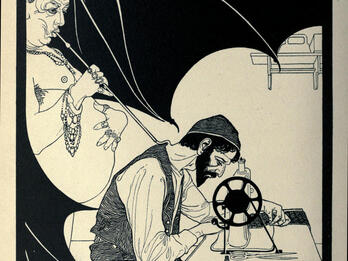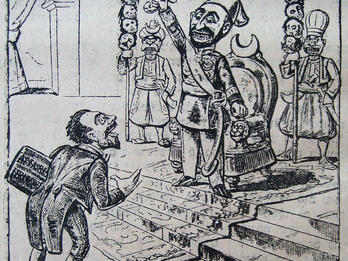Zionism
The Dreyfus trial transformed me into a Zionist. Not the current one in Rennes, but the original one in Paris that I witnessed in 1894. I was living in Paris then as a journalist and attended the sessions of the court martial until they were declared secret. I still see the accused enter the courtroom in his dark, laced-up artillery uniform. I hear him state his identity: “Alfred Dreyfus, capitaine d’artillerie,” with an affected nasal voice. And still ringing in my ear, unforgettably, are the screams of rage coming from the masses in the street outside the Ecole Militaire, where he was degraded: “Á mort! à mort les juifs! Kill him! Death to the Jews!” Death to all Jews because this one was a traitor! But was he really a traitor? I had a private conversation in those days with a military attaché who has been much talked about recently. The colonel did not know more about the matter than had been reported in the newspapers; but he believed that Dreyfus was guilty because it seemed impossible to him that seven officers would sentence a comrade without overwhelming poof. I, however, believed that he was innocent because I did not consider a Jewish officer capable of treason. It is not that I think Jews in general are better than other human beings. But in the special circumstances of Dreyfus, whom I did not even find particularly appealing, it seemed highly unlikely to me. A Jew, who as officer of the General Staff [Generalstab] has a smooth career of high honor ahead of him, cannot commit such a crime. For a member of a lower class, Jewish or Christian, I would not deny the possibility. But in the case of Alfred Dreyfus it was psychologically impossible. A wealthy man, who chose this career out of pure ambition, cannot have committed the most dishonorable crime possible. Since the Jews have been denied civic honorableness for such a long time, they now crave honor often with pathological intensity. In this respect, a Jewish officer is a potentiated Jew. My reasoning back then was quite likely the same as that of all members of my tribe since the beginning of the affair. Just because the psychological impossibility had been so clear to us from the start, Jews everywhere felt the innocence of Dreyfus even before the memorable campaign to establish the truth began. This sentiment among the Jews became the basis for unfavorable conclusions regarding our solidarity with each other in all, even the most appalling matters. I certainly do not deny the national solidarity of the Jews, but in this case this was not the issue. The Jews were simply the first to guess the miscarriage of justice because the crime seemed impossible to them and because in the course of centuries they already had had to lament countless victims of false accusations. However, one should beware of a sentimental or melodramatic perception of the Dreyfus case. This is more than an abstract event, even if it is tied to a quivering, suffering human being. One could argue that, on face value, the fate of the poor captain served only as an illustration of the general mood coursing through France. For the philosophical observer, however, it has long ceased to be a question of the guilt or innocence of a Jewish artillery officer. A miscarriage of justice deserves our sympathy, but we are not to take a position on it that is different from the one we would take if the suffering man were a member of another people. As long as people sit in judgment over others, there will be errors, and the fair-minded of all faiths and nations will come together in the desire to correct them. But the Dreyfus case encompasses more than just a miscarriage of justice; it encompasses the desire of the vast majority in France to condemn a Jew and in him all Jews. Death to the Jews! the crowd roared when the stripes where ripped from Dreyfus’ uniform. Since then “Down with the Jews!” has become a battle cry. Where? In France! In republican, modern, civilized France, a hundred years after the declaration of human rights. In history, the Dreyfus case can be compared only with the Revocation of the Edict of Nantes, which also happened after a long time—more than ninety years had passed since Henry IV had signed this edict, when Louis XIV revoked [its] freedom of religion for the Huguenots. The state is no longer the Ego of a Sun King; it is now congruent with the will of the people, but the result is similar. The people, or a large segment of it, no longer want human rights for the Jews; the edict of the great Revolution is being revoked.
And now we have arrived at the main issue, the historical lesson that an unbiased observer must absorb from the Dreyfus case. Up to that moment most of use believed that the solution of the Jewish question would come with the development of mankind toward tolerance. But if a highly civilized people that is progressing in all areas of life could end up taking such a path, what can be hoped for from all the other that peoples that still haven’t reached the heights that the French achieved a hundred years ago?
For Jews there is no other help and salvation than the return to their own nationhood and settlement on their own land and property. I wrote that in 1895 in my book The Jewish State under the impression of the harrowing first trial of Dreyfus. When I arrived at this conclusion I was still a stranger to my people. I knew little about the condition of our poor masses and nothing about the newer movements in Judaism. It was only through this publication that I came into contact with this circle of ideas and learned about the men who a short or a long time earlier had expressed similar thoughts.
Credits
Published in: The Posen Library of Jewish Culture and Civilization, vol. 7.




